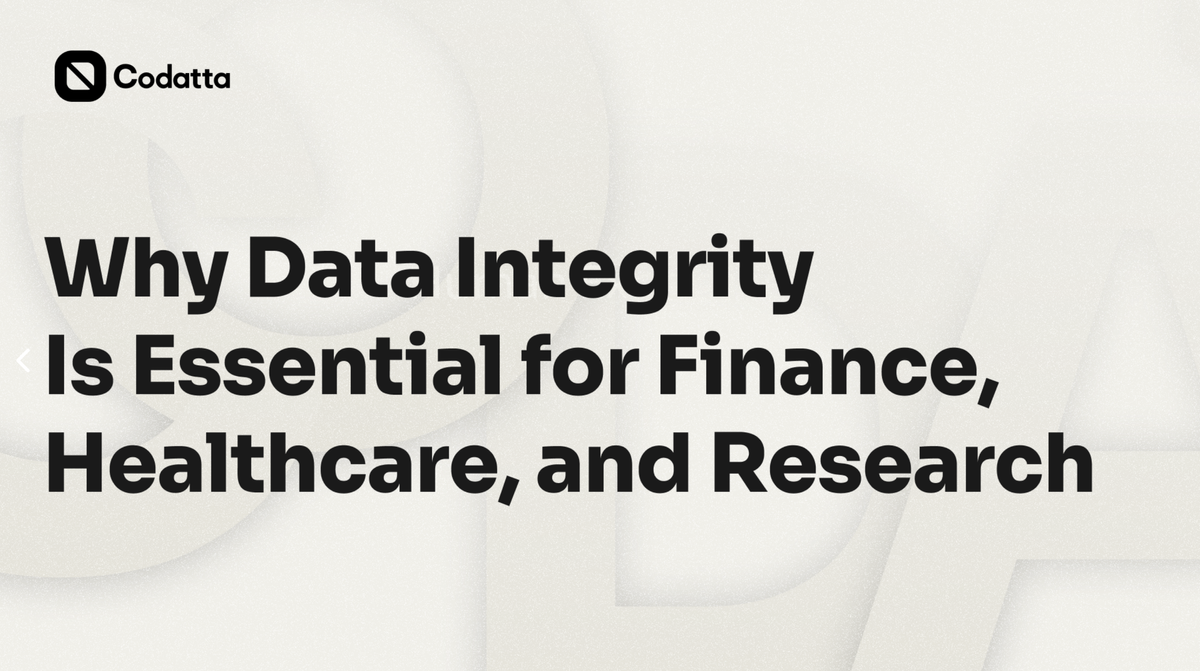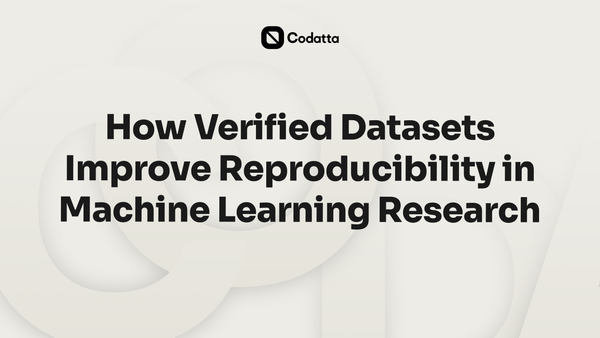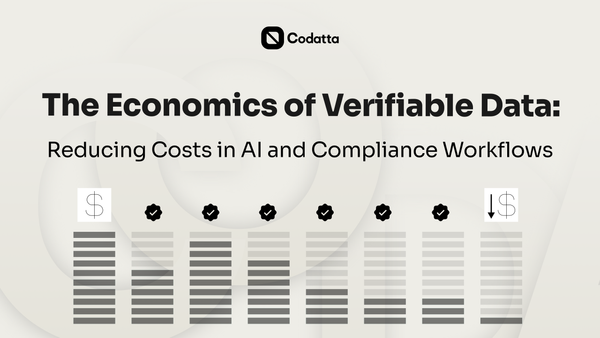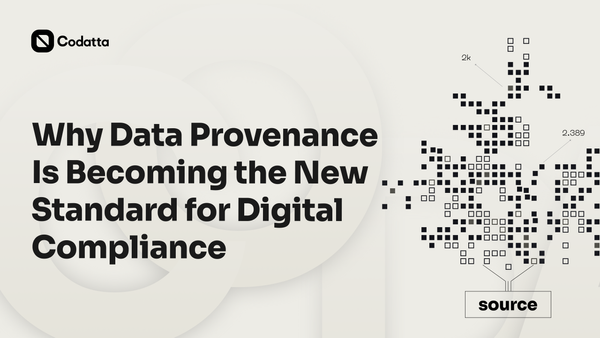Why Data Integrity Is Essential for Finance, Healthcare, and Research

Data integrity means ensuring the accuracy, consistency, and trustworthiness of information throughout its lifecycle. Without it, financial systems face compliance risks, healthcare outcomes can be compromised, and research results lose reliability.
This article looks at why data integrity is essential in finance, healthcare, and research, and how Codatta strengthens these foundations through verifiable metadata and transparent stewardship.
Read on to see why integrity is the cornerstone of usable data across critical domains.
Data Integrity in Finance
In finance, data integrity is essential for preventing fraud, ensuring compliance, and supporting AML/KYC obligations. Accurate data and robust data governance allow institutions to trace transactions, detect anomalies, and protect data from unauthorized access. Maintaining high data quality ensures that financial reporting remains reliable and that audits meet regulatory standards.
When integrity breaks down, the risks multiply. Incomplete or incorrect data entry can lead to errors in account annotation, exposing firms to scams, data breaches, and compliance violations. Without systems that ensure data integrity throughout the lifecycle, organizations face data loss, unreliable reporting, and increased vulnerability to fraud. These failures highlight the importance of data integrity not only for trust in financial transactions but also for avoiding penalties tied to governance and oversight.
For Codatta, the relevance is direct. Its protocol enables metadata annotation of blockchain addresses, creating transparent, verifiable records that strengthen data management and maintain data integrity across decentralized systems. Categories such as exchange, scam, or project affiliation can be applied with confidence, giving auditors and compliance officers the accurate data they need to monitor risks and prevent fraud. This metadata-backed system delivers reliable data for AML software, on-chain risk monitoring, and broader financial oversight, ensuring that data integrity is prioritized at every step of the process.
Data Integrity in Healthcare
Reliable metadata is a critical aspect of data in clinical research, patient monitoring, diagnostics, and regulatory reporting. For any healthcare organization, maintaining data integrity is essential because accurate and reliable data directly impacts patient safety and research outcomes. In clinical trials, for example, data integrity in clinical environments ensures that results are reproducible and compliant with FDA and EMA standards.
When data integrity issues arise, the risks are serious. Incorrect data, biased results, or missing context can lead to wrong diagnoses, compromised patient data, or data integrity risk in regulatory submissions. Studies such as the Nature Medicine2020 paper showed how incomplete or poorly annotated imaging datasets reduced the accuracy of AI-driven cancer diagnostics. These failures highlight how data integrity breaches undermine both innovation and patient trust.
Healthcare organizations must also comply with strict frameworks like HIPAA in the U.S. and GDPR in Europe, which require strong data protection and data security measures. These regulations emphasize protecting data from unauthorized access, preventing data corruption, and ensuring that data remains complete throughout its lifecycle. Effective governance depends on robust data management, secure data storage, and mechanisms that preserve both physical integrity and logical integrity of sensitive information.
For Codatta, this relevance is clear. Its framework demonstrates how structured, verifiable metadata strengthens data transparency and supports FAIR-aligned practices. By providing a way to annotate and validate metadata consistently, Codatta shows how integrity ensures that data remains usable, traceable, and trustworthy across domains. This approach to metadata curation reflects the same principles required to ensure data integrity in healthcare, offering value for big data, clinical data processing, and long-term data integration across complex health systems.
Data Integrity in Research
In research, maintaining data accuracy and integrity is essential for reproducibility, trust, and compliance with the FAIR principles (Findable, Accessible, Interoperable, and Reusable). High-quality datasets allow research findings to be validated, compared, and reused across disciplines, which is central to scientific data management and stewardship. Without clear provenance and consistent standards, results cannot be replicated, undermining both science and policy.
When data integrity is missing, the risks are immediate. Datasets become incomplete or unusable, and uncertainty over origins makes data sharing across repositories difficult. This problem has been highlighted in multiple European Commission reports under Horizon 2020 and by the Research Data Alliance, both stressing that research data must be traceable and supported by data backup systems that guard against data loss. Unreliable metadata and missing lineage also create compliance risks, especially in areas like healthcare information and healthcare data, where errors affect patient safety and regulatory outcomes.
For Codatta, the relevance is direct. Its framework provides structured metadata annotation and confidence scoring that strengthen data governance, improve transparency, and help researchers prioritize data that is reliable and reusable. This ensures that data integrity is not just a theoretical standard but a practical safeguard that keeps data accuracy intact across domains, from laboratory projects to large-scale open science initiatives.
Shared Challenges Across Domains
Across finance, healthcare, and research, organizations face similar risks when it comes to data integrity. Incomplete metadata, siloed systems, and poor traceability weaken trust in the organization’s data and make collaboration harder. Without consistent standards, even automated data pipelines cannot guarantee quality, and errors can cascade across systems.
A key issue is referential integrity, ensuring that identifiers, relationships, and records remain consistent across databases. When this breaks down, it leads to incorrect links, gaps in data access, and increased risk of duplication or corruption. In healthcare, for example, this can mean critical patient data becomes fragmented, slowing progress instead of improving healthcare outcomes. In finance and research, it undermines compliance and reproducibility.
These shared challenges highlight the need for trusted frameworks that ensure data is accurate, verifiable, and usable throughout its lifecycle. Reports from the European Commission on FAIR data (2018) and the Research Data Alliance emphasize that sustainable solutions require both strong governance and transparent processes that can be applied across domains.
Codatta addresses these pain points by providing a decentralized framework for structured metadata annotation, validation, and traceability. This strengthens confidence in the organization’s data, ensures reliable data access, and helps both enterprises and researchers manage information in ways that are transparent, scalable, and compliant.
Conclusion
Data integrity is not optional in finance, healthcare, or research. It ensures that the data remains accurate, reliable, and secure throughout its lifecycle. Without strong governance, systems risk errors, manipulation, and loss of trust. In every domain, the type of data may differ, but the principle is the same: integrity refers to protecting information from corruption, ensuring traceability, and making it usable for decision-making.
Codatta strengthens this foundation by providing a framework that improves metadata quality, protects against data manipulation, and enhances governance across domains. Its model supports traceability and accountability, helping organizations maintain data integrity at scale.
Ensuring that the data can be trusted is the cornerstone of better finance, safer healthcare, and more reproducible research findings. Explore how Codatta reinforces this commitment and makes data more reliable for the systems that depend on it.




